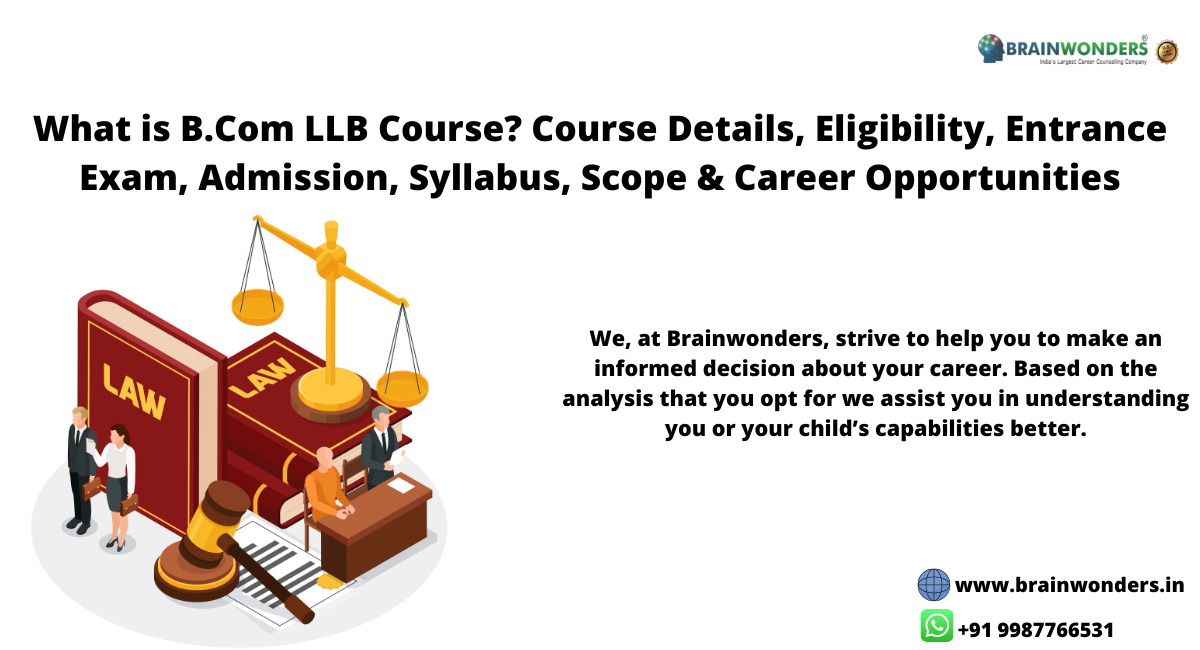

Are you aware which subjects and courses will bring you closer to your dream career?
Worry not, because the Brainwonders test and guidance will not only help you know it, but also follow it!
Blog
07 October,2023 | By Brainwonders

BCom LLB is a five-year professional law program that combines commerce and law subjects. In this integrated course, students learn about commerce topics such as Business Statistics, Business Communication, Auditing, and Economics. They also study subjects like Contract Law, Consumer Protection Law, Constitutional Law, Criminal Law, Legal Language, Statute Interpretation, and more.
The BCom LLB program consists of 10 semesters; students must complete it within eight years. Students are exposed to various teaching methods during their studies, including classroom lectures, case studies, and moot courts.
B.Com LLB (Bachelor of Commerce and Bachelor of Legislative Law) is an integrated dual degree course that combines law and commerce disciplines. The course is ideally suited for candidates who are interested in both corporate and legal studies. Furthermore, students can choose to specialise in one area of law, like corporate law, business law and taxation, based on their interest and competence.
Visit Page: What is DMIT Test ?How Can the DMIT Test Help You Shape Your Career - Brainwonders
| Course Name | BCom LLB (Bachelor of Commerce and Bachelor of Law) |
| Course Level | Undergraduate |
| Course Type | Full-time integrated course |
| Duration | 5 years |
| Internship Required | Mandatory internship of 20 weeks |
| Eligibility | Aspirants must obtain at least 50% in 12th from a recognised board |
| Admission | Entrance & Merit Based |
| Top Colleges |
|
BCom LLB is a five-year undergraduate program that combines business and law studies. It's an excellent choice for students interested in both fields. Subjects covered include business, corporate, taxation, and constitutional law. Graduates of this program can find opportunities in various sectors, including legal firms, corporations, and government organizations.
If you are interested in business and law, BCom LLB is an ideal course. It provides a unique perspective by combining business and legal education. This degree opens doors to various career paths, including Corporate Law, Intellectual Property Law, and Tax Law.
Eligibility criteria for BCom LLB programs may vary by institution. Generally, candidates should have completed their Class 12 from a recognized board with subjects like Economics, Business Studies, and Mathematics. Many top colleges require candidates to appear for entrance examinations for admission.
To be eligible for a BCom LLB program:
Though B.Com LLB is an integrated course, each college holds its own entrance test for admission. Meritorious students are often selected based on admission exam results and personal interviews. However, some institutions admit students to the B.Com LLB programme through a straight, merit-based admission system.
| Semester 1 | Semester 2 |
| Business Statistics | Business Communication |
| Financial Accounting | Economics |
| Auditing I | English II |
| English I | Law of Contract II |
| Law of Contract I | History of Courts, Legislation, and Legal Profession in India |
| Woman, Child, and the Law | Consumer Protection Law |
| Proficiency (Non-Credit) | Environmental Studies |
| Semester 3 | Semester 4 |
| Corporate Accounting | Interpretation of Statutes |
| Business Finance | Constitutional Law II |
| Law of Contract III | Law of Crimes II |
| Constitutional Law I | Law of Evidence |
| Law of Crimes I | Law of Tort |
| Legal Language | Family Law I |
| Foreign Language I (Non-Credit) | Research Methodology |
| Proficiency (Non-Credit) | Foreign language II (Non-Credit) |
| Proficiency (Non-Credit) |
| Semester 5 | Semester 6 |
| Jurisprudence I | Jurisprudence II |
| Civil Procedure Code I | Civil Procedure Code II |
| Labour Law I | Labour Law II |
| Company Law I | Company Law II |
| Criminal Procedure Code I | Criminal Procedure Code II |
| Family Law II | Drafting, Pleading, and Conveyancing |
| Foreign language I (Non-Credit) | Moot Court I |
| Proficiency (Non-Credit) | Proficiency (Non-Credit) |
| Semester 7 | Semester 8 |
| Public International Law | Private International Law |
| Property Law | Environmental Law |
| Taxation I | Taxation II |
| Administrative Law | Land Laws Including Ceiling |
| Human Rights and Humanitarian Law | Seminar I |
| Moot Court II | Moot Court III |
| Proficiency (Non-Credit) | Proficiency (Non-Credit) |
| Semester 9 | Semester 10 |
| Intellectual Property Rights | Criminology and Penology |
| Arbitration, Conciliation, and Alternate Dispute Resolution Systems | Project Report and Pre-Trial Preparation |
| Banking and Financial Institutions Including Negotiable Instruments | Professional Ethics |
| Seminar I | Public Interest Lawyering, ParaLegal Services, and Legal Aid |
| Seminar II | Seminar III |
| Moot Court IV | Moot Court V |
| Proficiency (Non-Credit) | Proficiency (Non-Credit) |
Applicants select colleges based on both the fee structure and the potential for placements. Top National Law Universities typically have course fees ranging from INR 4-15 lakhs. Government colleges tend to have lower fees compared to private ones. Here's a list of some top government and private colleges, alphabetically ordered, without any specific ranking.
Candidates who are looking forward to getting admission to the top colleges must vigorously prepare for the entrance exam conducted by the universities. Check the list of top law schools in India.
After the B.Com LLB course, newly graduated students can choose different career paths, from corporate law practice to professorship; the choices are diverse and high paying. Besides, students can receive scalable employment opportunities in campus placement. The course teaches students about business as well as the regulations that apply to that particular line of work. This course not only broadens one's breadth of study and career options but because it is an integrated programme, it delivers two degrees in five years, when it usually takes six years.
B.Com LLB degree holders can establish their own legal company after gaining job experience because they already have the necessary business abilities. Unlike more prominent law companies, independent law practice will give professionals greater independence and flexibility. Furthermore, the need for attorneys is continually increasing. Professionals might discover new clients through excellent marketing. Starting a legal practice is highly profitable for professionals with the necessary funds.
Upon completing an integrated BCom LLB course, candidates can explore numerous job opportunities. Here are some popular job profiles available to BCom LLB degree holders:
Job Description: In this job profile, one needs to advise and represent clients in civil as well as criminal cases. Lawyers present cases in the court of law and take part in all proceedings and hearings.
Average Annual CTC in INR: 6- 9 LPA
Job Description: Candidates opting to work in such a job profile are also lawyers who specialise in a specific field of law. Legal advisors are usually hired by governments as well as large organisations/ companies. The main task of a legal advisor is to protect their clients from any legal implication or consequence.
Average Annual CTC in INR: 7- 10 LPA
Job Description: In such a job profile one needs to do a lot of research work to gather factual data as well as physical evidence to support their claim. Apart from this, other responsibilities allocated to advocates include scrutinising and drafting contracts.
Average Annual CTC in INR: 5- 9 LPA
Job Description: In such a job profile an individual usually specialises in a specific area of law like tax, litigation, family or property. Solicitors offer legal advice to private as well as commercial clients.
Average Annual CTC in INR: 6- 9 LPA
Job Description: After completing an LLB degree candidates can also teach law at the college or university level.
Average Annual CTC in INR: 6- 10 LPA
In order to get admission into a B.Com LLB course, you must first meet the eligibility requirement; the eligibility criteria can vary from college to college. Check the essential eligibility criteria for B.Com LLB, including:
Admission to the B.Com LLB programme is based solely on merit and admission exam scores. Some public and private institutes require students to take the CLAT test. Institutes can also conduct interviews to evaluate candidates.
Visit Page: What is IQ Test? How to take an Online IQ Test? - Brainwonders
To pass the B.Com LLB degree, enrolled students must complete a minimum 20-week internship programme during the five-year course term. The internship programme may not be prolonged for more than four weeks at a time, according to the norms of the Bar Council of India. Students must also do an internship with trial and appellate lawyers at least once over the course's length.
Students can seek an internship at the following institutions
Furthermore, in the sixth semester of the course, each student must keep an internship journal, which will be examined by the internship mentor and a core faculty member.
Q.1 What is the full form of LLB?
Ans. The full form of LLB is Bachelor of Law or Legum Baccalaureus.
Q.2 What is the salary of an LLB?
Ans. The average salary of an LLB can range from INR 5 lakh to INR 8 lakh per annum.
Q.3 Can I do LLM without LLB?
Ans. It is mandatory for individuals to obtain their LLB before they may seek to pursue an LLM. This requirement is mandated by the Bar Council of India, which sets forth all regulations and requirements related to legal education.
Q.4 What is a PG Diploma in Labour Law?
Ans. PG Diploma in Labour Law is a one-year program where students are taught about legislation related to labour and the alteration of industrial situations.
Q.5 What are the career options after a Diploma in Cyber Law?
Ans. Students can work as the following after completing their diploma in cyber laws:
Let the best team of psychologists and career counsellors help you achieve your dream career!
_Course,_Admission,_Fees,_Salary,_Duration,_Syllabus,_Colleges.png)

